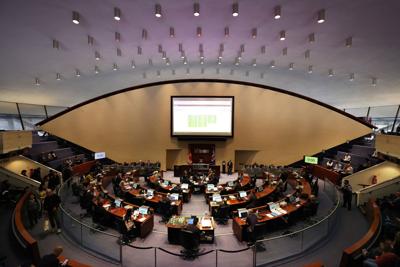After more than a year of╠²debate, ║ŻĮŪ╔ńŪ°╣┘═°city council approved a╠²controversial motion on Thursday to limit protests outside places of worship, schools and child-care centres.╠²
The bylaw, which will come into effect July 2,╠²allows╠²owners of these institutions to apply to have the city enforce temporary, protest-free zones of 50 metres outside their doors.╠²This is an increase over staff’s recommendation of 20 metres, a motion╠²successfully moved by Coun. James Pasternak. His initial push to extend the zones to 100 metres failed.
According to city staff, there are 3,000 buildings in ║ŻĮŪ╔ńŪ°╣┘═°that could qualify.
Under the new bylaw, the city could grant applicants these “bubble zones”╠²for one year╠²ŌĆö╠²double the length of time staff suggested.╠²Bylaw officers could ticket individuals who disregard the 50-metre, no-protest zone,╠²fining them up to $5,000. Police could arrest people if they refused to leave after that.
In Vaughan, Brampton and Oakville, local councils have passed blanket bans on protests outside places of worship extending 50 to 100 metres. No applications are required.╠²
Vaughan, the first municipality in Ontario to pass bubble-zone legislation to protect places of worship, did so after a Thornhill synagogue was targeted last year by a large protest while it hosted a real estate expo offering congregants advice on moving to Israel or╠²into illegal settlements in the occupied West Bank.
║ŻĮŪ╔ńŪ°╣┘═°councillors also voted to drop the requirement that building owners had to have been previously targeted by protesters to apply.╠²
Amendments by Coun. Rachel Chernos-Lin stripped the bylaw of an “overly bureaucratic process”╠²with the “requirement to be victimized,” and also increased the length of time the bubble zone would be active.╠²
Coun. Josh Matlow expressed dissatisfaction with the staff-drafted bylaw, which the city manager said was written to comply with both Charter rights and the result of╠²public consultations held over the last several weeks.╠²
“I want to support something, but it canŌĆÖt be performative,” said Matlow, who voted against the bubble-zone motion.
He attempted to remove the application process from the bylaw, to create automatic, permanent bubble zones around places of worship, schools and daycares. As well, he wanted to narrow the scope of prohibited behaviours from ŌĆ£an act of disapprovalŌĆØ concerning someone attending one of these institutions to ŌĆ£a targeted act of discouragement,ŌĆØ which he argued would more easily allow for peaceful protest and be more Charter compliant.╠²He also wanted council to request that police enforce this, rather than bylaw officers. These amendments were overwhelmingly voted down.╠²In the end,╠²Matlow╠²voted against the bubble zone motion, arguing that it would not be effective without his tweaks.
“This bubble wouldnŌĆÖt do anything about shootings at Jewish girls schools, hostage posters desecrated in our parks, the shooting in D.C.,” he said, referring to two Israeli embassy staffers in Washington who were shot to death Wednesday night╠²as they left an event at a Jewish museum.
The two people killed have been identified as Yaron Lischinsky, an Israeli citizen, and Sarah Milgrim, an American woman. They were soon to be engaged, according to the Israeli ambassador to the U.S. Police say a man was seen pacing outside the museum before he fatally shot the couple as they were leaving. The suspect, 30-year-old Elias Rodriguez of Chicago, has been arrested.
Police in Toronto, and York and Durham Regions, have since announced they would step up their presence at╠²synagogues, schools, community centres and all places of worship, although they have said there are no threats to the communities.
Supporters of the bylaw have said it is necessary to ensure people never have their entry into places of worship impeded. But detractors say it has the potential to erode freedom of speech protections, as well as their ability to hold these institutions to account.╠²
Coun. Diane Saxe, who voted for the motion, said Toronto’s Jewish community is “being terrorized” because of a “horrible, foreign war.”
“This would be the first tangible action from this council to show the Jewish people in this city they are welcome in Toronto,” she said.╠²
Pro-Palestinian group Jews Say No to Genocide, whose members are Jewish and have organized protests at synagogues, said in a statement to the Star that it “rejects the cynical use of concerns about antisemitism as cover for dismantling democratic rights.”
Other critics of the bylaw, including the╠²Canadian Civil Liberties Association and CUPE Local 79,╠²the union representing bylaw officers, have vowed to mount legal challenges against it over its Charter implications. Toronto’s city solicitor said at council Thursday she believes the bylaw, as originally written by the city manager’s office, will stand up in court.╠²
Early on in the five-hour debate, an attempt was made by Coun. Chris Moise to shelve the bubble-zone motion. Moise said that the bylaw would be made redundant if╠².╠²Moise’s motion was defeated.
Despite Mayor Olivia Chow voicing support on Wednesday for city staff’s bubble-zone bylaw proposal, she voted in favour of deferring the motion. She also unsuccessfully voted to not increase the length the zones would be active and not to increase the size.
But once those amendments had been passed, Chow voted to adopt the bubble-zone motion.╠²The motion approving the amended bylaw passed 16-9.
Editor’s note - May 23, 2025
This article was updated from a previous version to add further context around Coun. Josh Matlow’s decision to vote against the bubble zone motion.╠²




















To join the conversation set a first and last name in your user profile.
Sign in or register for free to join the Conversation